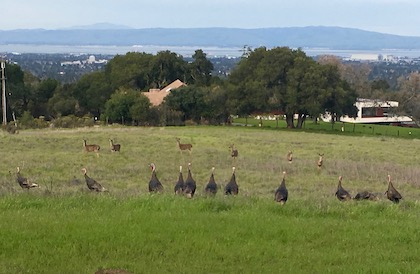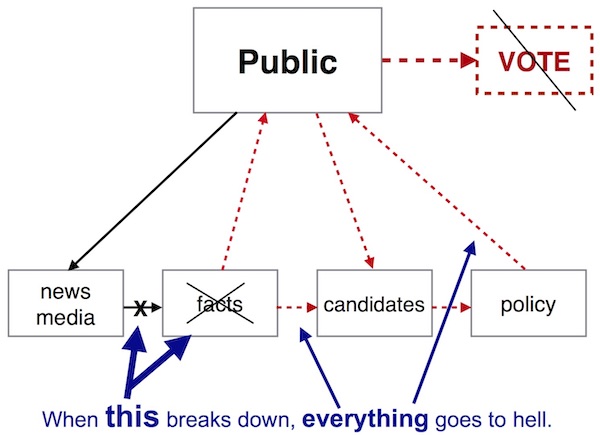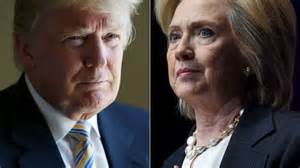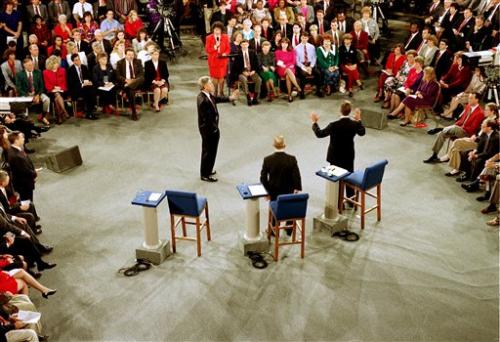The third Democratic debate is coming up, so it’s a good time to weigh in on some of my long-standing campaign and political news coverage pet peeves, many of which have been driving me crazy for years. (Apologies for not precisely citing the basis for each one–calling myself out, shame on me!)
“When you’re ‘explaining’, you’re losing.”
This refers to politicians who are correcting or clarifying a position or statement of theirs, usually after it has come under attack from an opponent, or the press.
News Hour, July 8, 2019 – Politics Monday (video)
Amy Walter (News Hour) invoked it in July when assessing Joe Biden’s explanation of his own comments about working with segregationists to get bills passed, and his ensuing clash with Kamala Harris over busing policy in the first Democratic debate. Walter referred to the phrase as a “classic line in politics”. It’s definitely not the first time I’ve heard it. Certainly, excessive ‘splainin’ by a candidate can take on a pleading quality and grow old quickly–a case of ‘methinks thou dost protest too much’–especially if the explanation is unconvincing. But the critique can come too quickly or, as in this case, after the media itself has been hammering on the issue, forcing more response by ‘keeping it alive in the news cycle’ which is unfair. In fierce elections, where attacks are the weapon of choice and the media has a habit of capitalizing on them, how is a candidate supposed to respond? By letting the mischaracterization or inaccuracy go unchallenged? Methinks not. Media: Focus on clarifying the issue involved, and let us decide who’s right. I’m calling this a Mountain Out of a Molehill. (For more on Kamala & Joe, see my [intlink id=”2248″ type=”post”]previous blog[/intlink].)
“No overarching message.”
I last heard this one from David Brooks (also News Hour). It is yet another overworked trope of the punditry and concerns a candidate’s lack of concision or ‘branding’ in their messaging on what they stand for. As above, it is primarily about campaign style, so does not, technically, break the Focus on Issues, Not Politics Rule since it is okay to comment on politics. But given the media’s predominant ‘cover-the-horse-race’ DNA, I think we’re justified in at least paring down some of the (what seems like incessant) drivel. Sure, messaging is important, but, for the amount of play this gets, not at the expense of content. We are long past the point of needing to reduce the many massive, and massively complex, issues we face, to pithy soundbites. Let’s trade that for a deeper examination of things that really matter. That is the only way we will be able to shape policy to improve our lives. I’m calling this out as an OverSimplification and Mountain Out of Molehill.
“message hardened” & “window closed”
Both of these were used in reference to the Special Prosecutor Investigation on Russian interference in the 2016 election, and possible Trump connections to it. The first phrase was offered as the reason for concluding that there is no recourse to Attorney General William Barr’s pronouncement that Robert Mueller “found no wrongdoing on the part of Trump” in his (Mueller’s) report on the investigation, despite substantial evidence (in the report) to the contrary and multiple, available paths for pursuing that evidence, because Barr’s “message had hardened [in the public’s mind]” and, so, continuing would not be politically viable. That assessment was repeated by many news outlets as laid out in Margaret Sullivan’s Washington Post piece, which critiqued it.
The second phrase was used by Bill Maher on his political satire show, Real Time. Maher, though not a journalist, echoed the oft-used sentiment by others when he said: ~“Mueller failed to be decisive, so the window closed [on getting the true findings of the report].”
This particular type of False Choice really sticks in my craw because it clearly prioritizes a veneer of ‘political viability’ of the issue (unsupportive polls) over its’ underlying substance and importance–in this case, getting to the bottom of potential serious wrongdoing via real, existing legal paths. The result? A press short-circuiting the Democratic process, de facto anointing itself as the ultimate arbiter of the decision, rather than the public!
This continues the insidious trend of slowly, incrementally stripping the electorate of their power, ‘dumbing them down’, by sending a message that there is nothing they can do, when, in fact, there is (several congressional & other investigations continue). It is particularly confounding coming from a press and punditry that relentlessly exposes Trump’s (and others’) lies, digging the public out from under them, only to heap misleading notions like these back on. Arrgh–have we gone mad? Call Outs: False Choice (decide quickly, or opportunity is gone) and Focus on Issues, Not Politics.
Campaign strategy: Attack Trump or focus on issues?
This question, posed by The New York Times on 2020 Democratic campaign strategy, is yet another familiar False Choice the press routinely offers up in their parlor game of ‘horse race’ politics. Suggesting the candidates must choose one strategy or the other, but not both, is an OverSimplification. To be fair, the article uses the question as a ‘jumping off point’ to examine Trump’s divisive racial rhetoric, and how (or whether) it plays in primary vs. general election Democratic strategies, plus, it is answered by strategists and candidates who say: ‘do both’. (Yea!) Certainly, Trump’s rhetoric, its affect and importance, are well understood at this point and merit covering. But, again, not at the expense of issues, which continue to get short shrift in our ever increasingly complex world. I’m just really tired of this emphasis, but we’re going to be seeing a lot more of it, I’m afraid. Call Outs: False Choice, OverSimplification and Focus on Issues, Not Politics.
Exclusive MSNBC coverage of SC Democratic Convention
The South Carolina Democratic Party granted exclusive rights for video coverage of their June convention to MSNBC over the protestations of 5 other major networks, according to the AP. The reason given: the candidates would get equal time since their full speeches would be aired. More than 150 journalists were also credentialed, but–whoa! Is this legal? It doesn’t seem like it should be. Call Outs: MSNBC, in the name of journalistic integrity and fairness, you should have refused the offer of exclusive rights and allowed the other networks to Cover the Topic of the SC Democratic convention, along with yourself.

 Turkeys vs. deer; looks like
Turkeys vs. deer; looks like

